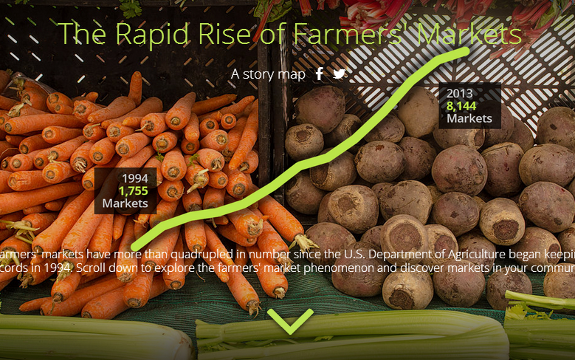How to Bypass Mega Grocery Chains and Buy Direct from Organic Farms

 There are three reasons that Big Ag can’t compete with the small farm in the long-term:
There are three reasons that Big Ag can’t compete with the small farm in the long-term:
- Research at the land grant universities in the United States is often funded by big agribusiness corporations, but consumers want fresh, organic food – not GMO, chemical-laden, mono-cropped refuse.
- Some of the most promising solutions don’t offer huge cash rewards to agribusiness, so it is possible that some of the most worthy farming practices and innovations are not getting adequately promoted – that is until you visit local businesses and farmer’s market serving up what consumers really want.
- Government interventions of mandates, grants, patent laws, and subsidies can dictate where momentum comes from for future farming practice choices. Farmer’s markets have grown by a whopping 76% in the past 8 years. No subsidy for GMO corn or soy, ethanol, or other Big Ag business can compete with that kind of growth.
Even though the USDA and EPA have shut down small farming co-ops in an attack against food sovereignty (since the organizations are infiltrated by Big Ag and biotech companies like Dow, Bayer, and Monsanto), people are flocking to organic food sources.
This doesn’t mean that some farmer’s markets aren’t still full of GMOs, though. Genetically modified ingredients find their way into every nook and cranny since so much of our acreage is now planted with GM seed. But by asking some simple questions such as: “is this certified organic” or ‘if not certified, was this food grown with chemical fertilizers and pesticides/herbicides,” you can find out what you’re really buying. You can also get to know specific growers and farms in your area. Some even invite you to see their operations in person so that you know exactly how your food is grown.
You can also check out the National Resource Defense Council’s interactive Eat Local tool to try to get your food straight from the farmer. This way, you cut out the Big Food companies that jack up prices and charge extra for shipping, refrigeration, and putting stuff in your food you don’t want in it to begin with.
Read: Join the Slow Food Movement – Stepping Toward Food Sovereignty
If you want to find a farmer’s market near you, you can check out the USDA’s listings, here. Just remember to be discerning when you shop. Or, you can check out organic.org’s site and click on your state to find a local food seller. Some larger chains like Whole Foods are listed, but so are smaller, farm to consumer markets, as well as co-ops.
If you can’t find a farmer’s market that sells organic in your area, there are also online retailers who deliver, such as:
- Papa’s Organic: Fruit, vegetables, dairy, spice, etc.
- AzureStandard: Produce, bulk foods, dairy
- Green Polka Dot Box: Offers GMO-free foods. I especially like their close-out closet for cheap organic foods. They are near their expiration date, but that just means to eat them as soon as they are delivered.
If you are tired of the GMO, non-organic, high-fructose corn syrup, MSG-laden foods they sell at your Big Box and big chain grocery stores, simply cut out the middle-man. Farmers markets, food co-ops, and online shopping is the way to get healthful, seasonal foods for less.

I work in the fruit and vege business. I’ve talked with a few who give out organic licenses.
Organic licensing is a corporate business and they also have priorities for profits.
They approve many licenses with below par specifications.
Many say they have organic produce, when it in fact isn’t (you see these claimers at local markets buying non-organic produce, very very amusing to see!)
Organic licenses still have pesticides.
Typically 10-20% of the normal regulated amount of spray used on non-organic crops.
They also can use non-synthetic natural ingredients as pesticides.
These have been shown recently in studies to still have negative health effects, making no difference.
Either way they are made to kill creatures, these chemicals natural or not change our gene expression and cause abnormal cells.
NOTE: You DON’T need organic for all produce.
Such as bananas and pumpkins where the pesticides doesn’t penetrate the skin membrane. Apples and pears for example would be better off being organic.
Organic is an improvement, but not the best.
The only way to avoid them is companion grown fruit and vegetables (spray-free) using 2 plants in the same bed to fend-off each other’s pests.
You can eat pumpkin skin and pumpkin skin is VERY annoying to peel. Get pumpkin organic.
Didn’t think of that, as my personal preference is to remove the skin, cheers for pointing that out 😛
Bananas and pumpkins may not be effected through the skin, but ALL plants that are sprayed with poisons are effected by chemicals through their root system. So all these sprayed food plants have toxic poisons inside of them.
Nets, friendly predators, green houses, and flowers in the garden are a safer solution to the home organic garden.